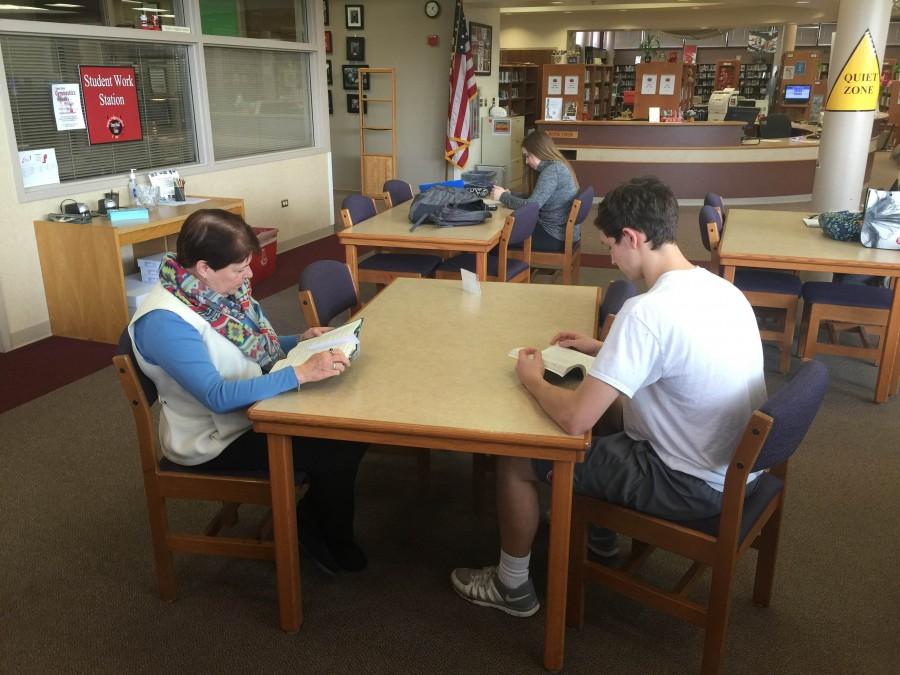Required or recreational reading?
Junior JP Medick shares a table with one of the librarians as he gets ready to read for pleasure.
“Each element the author includes can be related to another element of the novel” is what my English teacher told me while our class read The Great Gatsby by F. Scott Fitzgerald. “His fancy English shirts that were thrown are his desperation for the past… the eyes are not the eyes of a god, but represent how each character is constantly judged…” and so on — all of these being a common topic of discussion. We had to know exactly how old the narrator is (30 years old, by the way), the color of Gatsby’s car, and a viable significance of the ominous green light. Yet, when I read this book freshman year for pleasure, did I notice the secrecy of the characters and what the party scenes can tell the reader about Gatsby? Not particularly. But was it bad that I didn’t?
Without the pressure of a grade, our critical reading skills may subside, but that does not mean we get less of an experience out of the novel. Critical Thinking for Beginners makes the point that “pleasure reading rarely entails note-taking” and that note-taking is required for critical reading, especially when the reader’s goal is to analyze and critique the author’s words. Identifying goals of the character thematic objects and how they can relate to the theme(s), and the reasoning for the diction is not an easy task when no notes are taken. Yet, who is going to take notes when they just want to see the cute girl and sensitive guy end up together in the John Green book?
Reading does not have to be as strict as English class makes it seem. While critical reading may be important for your test on The House on Mango Street, reading the book outside of class does not have the “high-stakes” quality it does when it is for class. High school students seem to go into analytical mode when reading is required and develop a genuine appreciation when the reading is recreational.
After talking to a few students on their thoughts of recreational reading instead of required reading, one book stood out in particular that showed the difference between reading for pleasure or for a grade: The Catcher in the Rye.
Zeana Badawi, senior, commented on how her classmates despised the character of Holden Caulfield, calling him whiney, self-obsessed, and boring. Her own reading of the J.D. Salinger novel, outside of the class, held a much more favorable account of Caulfield, and she remarked that she saw him as a symbol for adolescence, as he was seen when the novel was published in 1951. Yet, her classmates still refuted her and painted him as insufferable, and thus, it was difficult for them to enjoy the book like Badawi did.
“A larger appreciation for one of my current favorite books, Fahrenheit 451, came from reading it in class sophomore year. Yes, it’s plot is interesting and Guy Montag is a great character, but I didn’t put together all of the literary techniques and symbols and such when I read it on my own,” said Nicole Murphy, senior and frequent reader.
A greater and thorough understanding of a novel comes from the deep reading we use when the work is required. Our English teachers can help with that, but what is still required is some motivation or desire to read the novel. The current decline of recreational readers is depressing — even at our school, out of 50 students asked, 27 of them said they frequently read for pleasure. We know that reading makes you smarter, among other things, yet it is still a withering hobby. But thankfully Shakespeare is still required and when freshmen read Romeo & Juliet, perhaps they may walk away and think about reading over the summer for fun.

When she's not working at the movie theatre or forcing her dogs to cuddle with her, Mackenzie Murtaugh is consistently reading at least 6 books at a time...

Senior Alex Herbst is a photographer for Devils' Advo. He enjoys spending time with his friends, watching movies, and spending time outside. Alex is...













